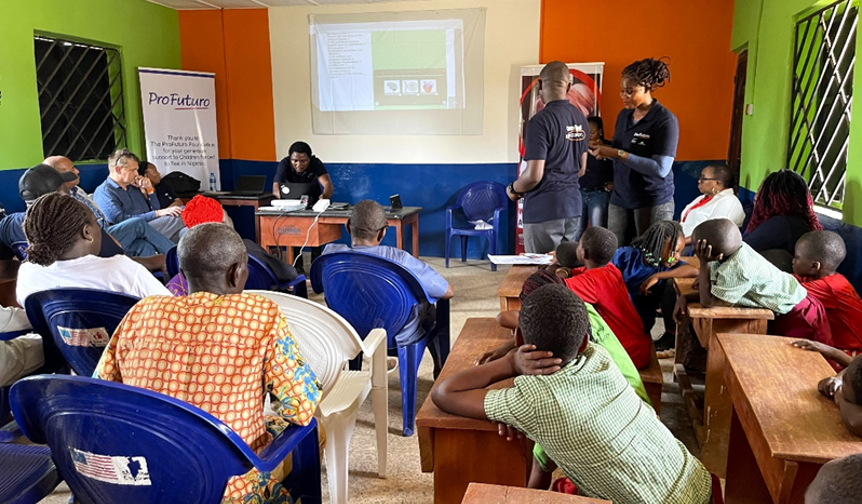Connected Learning: Transforming Education for Refugees and the Host Community.

Connected Learning: Transforming Education for Refugees and the Host Community.
The pursuit of quality education for refugee children in Nigeria is a tale marked by both adversity and optimism. Nigeria is home to nearly 99,000 refugees, over half of whom are of school age and mostly come from Cameroon.
Despite concerted efforts following Nigeria's commitment at the 2019 Global Refugee Forum to enrol all refugee children in primary schools by 2023, there remains a notable gap in actual enrollment rates. Currently, only 49% of refugee children are attending primary school, a figure that stands in stark contrast to the national enrollment rate of 86%. This disparity becomes even more pronounced at the secondary education level.
In areas that host refugees, the educational system faces many difficulties such as overcrowded classrooms, limited resources like textbooks and computers, and a severe lack of basic infrastructure like electricity and internet access. Additionally, the absence of playgrounds and sports facilities deprives students of opportunities for a well-rounded education.
In an effort to turn the tide, UNHCR in collaboration with ProFuturo Foundation, is implementing a unique educational project in Benue and Cross River States. Eileen Akintemi, UNHCR's Assistant Education Officer, describes this as a first-of-its-kind initiative in these regions, aiming to revolutionize the learning experience with modern technology and solar
energy. Over 3,500 children and 90 teachers have benefited from this project, gaining access to tablets, laptops, and a more interactive learning environment.
Eight-year-old pupil Gift from St Peter’s Primary School Adagom shares, “I learn faster through pictures.” Gift, like many other children, benefits from the innovative teaching methods introduced by the project. These methods, which include the use of visual aids and interactive digital content, have proven to be particularly effective for young learners.
The initiative also fosters active participation among students in the classroom. By capturing their interest and motivation to learn, it aims to not only boost student enrollment and retention rates but also to expand their understanding and skills in using digital tools and navigating online platforms.
Despite these efforts, the reach of this project remains limited, highlighting the need for broader, more inclusive educational initiatives. Many refugee children still find themselves outside the purview of these advancements, underscoring a pressing need to expand the program's scope.
The educational plight of refugee children in Nigeria mirrors a global challenge. This highlights the importance of effective programs and innovative educational approaches that leverage technology and digital platforms such as this one. However, such approaches must be beneficial for both the refugees and the host communities, ensuring mutual growth, and enabling them both to thrive together.

With support from the ProFuturo Foundation, UNHCR launched the digital education project alongside government officials, traditional leaders, partners, and refugee/national children in Nigeria.

